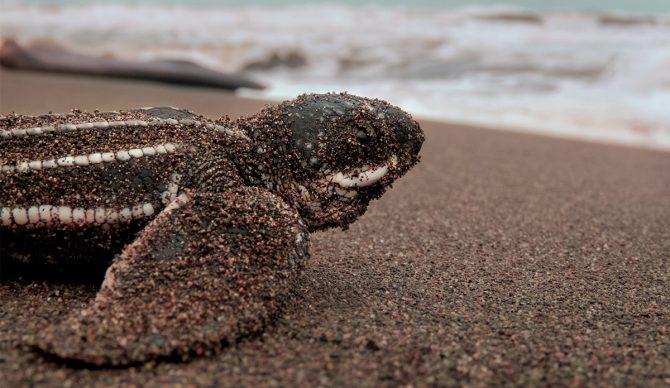
Photo: Max Gotts//Unsplash
In February of last year, the president of Panama signed a law which would grant legal protections to nature. While environmental protection laws are typically passed because of their benefit to humans, this one considers the rights of the wildlife itself. The law, which went into effect earlier this year, is now being used to protect sea turtles.
“This law aims, first and foremost, to acknowledge Nature as a subject of law, therefore redefining its legal scope of protection and guaranteeing an inherent list of rights to be safeguarded,” said Congressman Juan Diego Vásquez Gutiérrez, an independent politician who drafted and edited the bill before introducing it to Panama’s National Assembly. Some of Nature’s rights recognized in the law include the right to exist, persist, and regenerate its life cycles; the right to timely and effective restoration; and the right to the preservation of its water cycles. In a press release announcing its passage, Constanza Prieto Figelist, Latin American Legal Director at Earth Law Center, clarified that sea turtles were going to be an immediate beneficiary of the new legal power. “We look forward to working with Panama and our partners to implement the Rights of Nature law, with one initial target being a rights-based law protecting sea turtle populations,” he said.
“Any Panamanian citizen [can] be the voice of sea turtles and defend them legally,” said Callie Veelenturf, a marine conservation biologist who heads The Leatherback Project and originally proposed the law to Panama’s first lady. “We will be able to hold governments, corporations, and public citizens legally accountable for violations of the rights of sea turtles.”
As AP reports, Panama has some of the most important nesting spots in the world for leatherback sea turtles and hawksbill sea turtles. When the pandemic took away ecotourism as a main source of income for Panamanians, many began harvesting sea turtle eggs and some nesting turtles to sell for meat and their shells. Though it was already illegal to take sea turtles and their eggs from national parks and protected marine areas, the law was more ambiguous in other parts of the country. This new law now provides a clear legal means for animal rights groups to defend the creatures.
Though it has gained more traction in recent years, the concept of granting legal Rights of Nature has existed since USC professor Christopher D. Stone penned Should Trees Have Standing in 1972. Then, in 2006 Tamaqua Borough, Pennsylvania, passed what is widely considered to be the first right to nature law. The law, which banned the dumping of toxic sewage, specifically named “natural communities and ecosystems” as being beneficiaries of the rights granted by the law, in addition to humans. Then, in 2008 Ecuador was the first country to write rights of nature into its constitution. Bolivia and Uganda have both enacted national rights of nature laws, and a growing number other countries have passed similar legislation on the local level.
In the United States, though Rights of Nature laws do exist, since they are only local so far, and thus are subordinate to national laws. As a result, no U.S. court has ever upheld a Rights of Nature law. In November 2020, the voters of Orange County, Florida, overwhelmingly approved a charter amendment that secured the rights of waterways to exist and be protected. This led to the filing of the first American Rights of Nature case, when the law was used to bring a lawsuit against a housing development on behalf of the wetlands it was encroaching on. However, the suit was tossed out, on account of a state law, approved by legislators at the same time as the amendment, that disallowed granting legal rights to any part of the environment.
Though the laws have been met with roadblocks in the United States, the passing of the Panamanian law, and others around the world, signals a growing support for this type of legislation and its ability to aid natural ecosystems that previously had no effective legal instrument to protect them.

